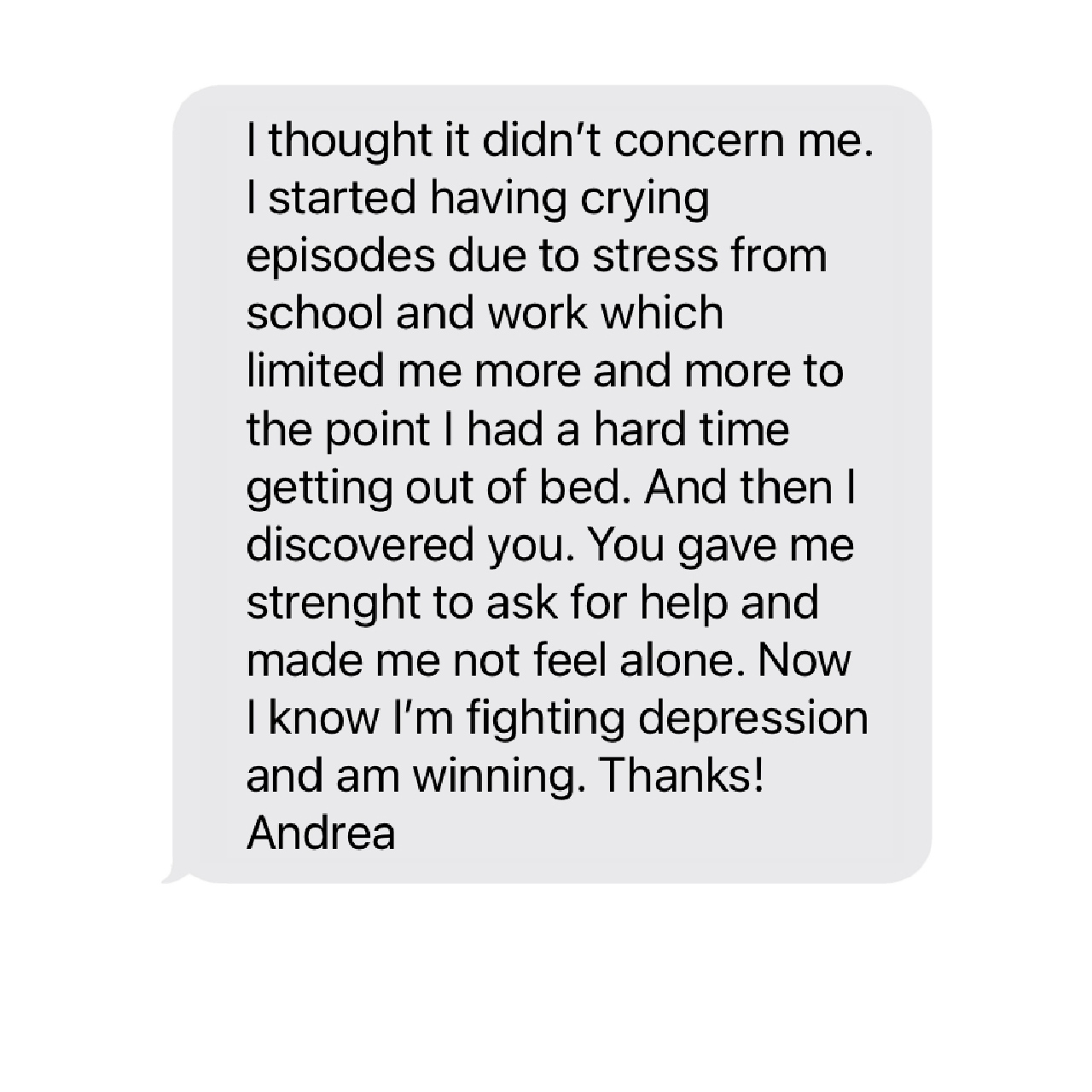Mental health
Healthy mind is an essential part of overal health. It needs the same amount of attention as your body. That’s why you should be #feelinggood. The mind can get ill just as easy as our breasts, balls, head or heart do.

What is mental health?
Mental health means being in good condition and able to deal with the occasional “blues”.
A healthy individual is able to:
- Receive and process information
- Deal with problems and think logically
- Create new things
- Actively engage in the events surrounding them
- Adapt to new situations
- Communicate well
- Be emotionally stable and deal with their emotions
- Relax even after the most hectic day

And what is mental illness?
Mental illness is a condition which negatively impacts our thinking, experiences and relationships.
Mental illness is also the most common reason for sick leaves, early retirements and disabilities. The incidence is increased due to unbalanced lifestyle and underestimating factors such as:
- Stress, being in a rush
- Unhealthy diet
- Lack of sleep
- High work tempo
- Lack of friends

Do you have a question about mental health?
We’ll gladly answer.
How to take care of your mental health
Try sticking to these most essential habits. They might sound banal but have radical impact on your well-being.
- Sleep well
Don’t underestimate the power of a good night sleep. It’s vital for your physical and mental regeneration. Are you the chronic sleepless individual? Stick to the sleep hygiene rules – regularity of going to bed and waking up to enjoy beneficial 7-8 hours of dreaming. Your body and mind will thank you later.
- Eat healthily
Balanced, nutritious and regular. You’ll reward the body and mind, fill up with energy and benefit the system, including the nervous one. Repeated long-term simple sugar consumption and nutrient and vitamin deficiency leds to various physical and mental illnesses.
- From exercise to happiness
Like literally. Endorphin, happy hormone, is being secreted after only 30 minutes of swift movement. We don’t say “healthy body, healthy mind” for nothing. Find an enetertaining activity. You don’t need to spend hours at the gym – even a walk to/from work counts – or start exercising while watching your favourite series. It’ll boost not only your condition but your mental health and self-confidence as well.
- Plan and relax
Decide how much time you’ll dedicate to work or school and how much time you’ll spend on yourself. The busier you are, the kinder you should be to yourself. Good time management is essential for well-being. Enjoy the little things and joys, and don’t forget to relax and recharge the energy – it could be Netflix, could be listening to music or running. Organise your precious time, consider relaxing and don’t overburden yourself.
- No stress
Make a to-do list every day. Set realistic goals. Any exercise helps to fight stress – it could be a sport or relaxing exercise. Relaxing exercises help manage anxieties and support well-being. Another great method is yoga which connects relaxation, physical activity and breathing exercises together. It’ll teach you to focus on the moment and not overload yourself with things you can’t control.
Don’t be scared to ask for help
Seeking professional help, even after not feeling good for long, is still taboo for many. Psychiatric diagnoses are stigmatised and therapy is talked about with shame: “I’m not that crazy to go to therapy!” or “My problem is not serious enough to talk about it with a professional.” People suffering from mental illness often feel they need to deal with their problems on their own.
The mind can get ill just as easy as our breasts, balls, head or heart do. Diabetes, a broken bone or a sore throat are disorders that need to be treated – the same goes for mental illnesses.
FAQ
What to do when some of these symptoms appear?
If someone has a mental illness, don’t just tell them to “try harder”. Give them the much-needed support and understanding. They’re far from alone.
When and who to ask for help?
Whenever you feel like you need it.
Who to ask?
- Close person you trust
- Doctor, therapist, psychologist
- Support groups, patient organisations
- Crisis centres, helplines
What are the steps to take?
- Are you in a situation that must be sorted out immediately and can’t deal with it alone? Visit a crisis centre or call a helpline. Children under 18 can visit child crisis centres.
- Are you in a situation where it’s unnecessary to sort it out immediately?
- Can you cover the expense? (800–1,500 CZK per session) See a therapist. They can send you to see a psychiatrist. You’ll find a list of psychotherapists at www.czap.cz, where you can verify their education.
- Can you not cover the expense? See your GP, who’ll recommend you to a professional covered by your health insurance company.
- Don’t you know who to choose? See your GP, and they’ll tell you.
What about the crisis centres?
A crisis is a difficult life situation that one can’t deal with alone.
It could be:
- Losing someone
- Relationship or personal problems
- Serious situation
- Mental illness
- Current mental illness getting worse
Czech crisis centres to go to:
- In-person:
- Call (Czech):
- You’re an adult and need help for yourself: 116 123
- You’re a parent and need help for your kid: 116 00
- You’re a child or a student: 116 111
- You’re in a life-threatening situation: 155!
- Seznam Linek důvěry
Psychiatrist – psychologist – therapist – coach
Psychiatrist
- Doctor; can prescribe medication
- Your GP will give you a referral to see one
- Deals with serious mental illnesses which require medication
Psychologist
- Psychology degree; wide range of employment
- Heals with words
- Helps find the lost balance, process traumatic experiences and understand yourself
- Psychological diagnostics
Therapist
- Has psychotherapy training
- You can find them on your own or through your GP
- Focuses on your past, present and future, helps with coping, orientation and understanding
Coach
- Has coach training
- You can find them on your own
- The goals is to motivate you and boost your performance
- Focuses on present and future
- Offers new solutions, gets you out of stereotypes
How to talk to a person with mental illness?
If there’s someone close to you suffering from a mental illness, do not judge the or tell them to “try harder”. Give them the much needed support and understanding. They’re far from alone in this.
- Listen – Rule number one while communicating with someone with mental illness is to listen. It’s important to give them space and try to understand their needs. For example, it’s absolutely inappropriate to unnecessarily cheer up or force a depressed person into doing activities. Such communication only makes depression worse because it makes the person in question feel like they’re not able to do it.
- Do not lecture or downplay – Healthy person has no clue what it’s like to have a mental illness. There’s a better chance the person in question will open up, and we’ll find out what’s been bothering them, if we give them space and do not lecture them. The moment we start giving lessons, the individual shuts off and the communicating is ruined. It’s important, for example, with anorexia. Parents tend to preach, blame overlook the child and their problem. Attention and listening is often the thing the child needs the most and it can lead to illness development.
- Pay attention and ask – Pay attention and ask them about situations that make them feel better.
- Offer help – Offer them help to find professionals but don’t push too hard if they protest. People often force the person who confided in them to seek help or to look at the situation from a different angle. It’s usually counterproductive. If they refuse professional help, go back to other points.



